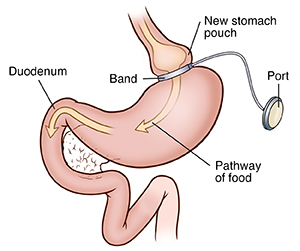Bariatric Surgery: Laparoscopic Adjustable Banding
Weight-loss (bariatric) surgery changes the size of your stomach to help you lose weight. The surgery may also keep your body from absorbing nutrients. The goal is to limit how much food can be eaten or absorbed at one time, or both. There are several types of weight-loss surgery. You are having laparoscopic adjustable gastric banding. This surgery closes off part of your stomach to make a very small pouch. This is the most common type of weight-loss surgery that restricts how much food you can eat.
The procedure
The surgeon puts an adjustable band around the top part of your stomach. The band is like a ring. It makes a small pouch in your upper stomach. This pouch holds only a few tablespoons of food. Food passes slowly through a narrow opening at the bottom of the pouch. This lets you feel full longer. The size of the band can be changed by using a port placed under the skin. The port gives your healthcare provider a way to put in a needle. They use the needle to add or remove fluid from the band. This is done to make the size of the opening bigger or smaller. Changing the band opening size changes how quickly food leaves the new pouch.

Gallstone risk
Weight-loss surgery is meant to cause a large amount of weight loss. Weight loss can cause gallstones. These are collections of solid material in the gallbladder. These collections could potentially cause blockage, inflammation, and pain. To prevent this, the surgeon may remove the gallbladder during your surgery if you already have gallstones. Or you may need your gallbladder removed at a later date.
All types of weight-loss surgery have different advantages and disadvantages. Be sure to discuss the risks and complications of this surgery with your healthcare provider.
Online Medical Reviewer:
Jonas DeMuro MD
Online Medical Reviewer:
Raymond Kent Turley BSN MSN RN
Online Medical Reviewer:
Rita Sather RN
Date Last Reviewed:
7/1/2022
© 2000-2025 The StayWell Company, LLC. All rights reserved. This information is not intended as a substitute for professional medical care. Always follow your healthcare professional's instructions.